Active voice and Passive voice Shalova Aigul, the

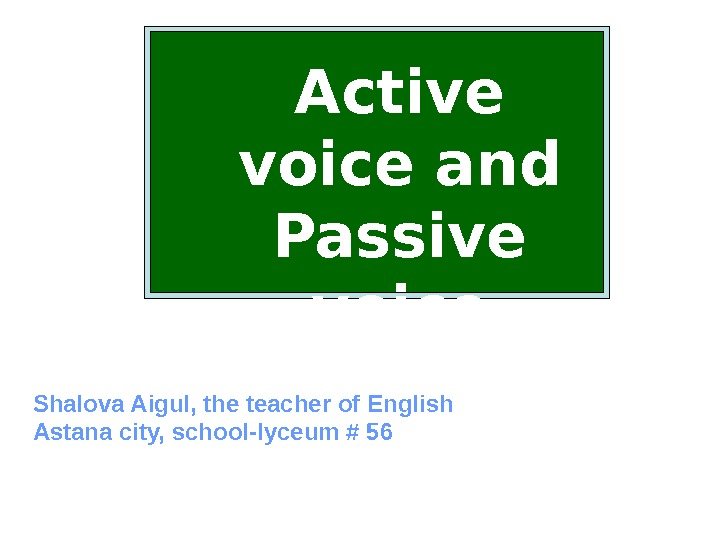
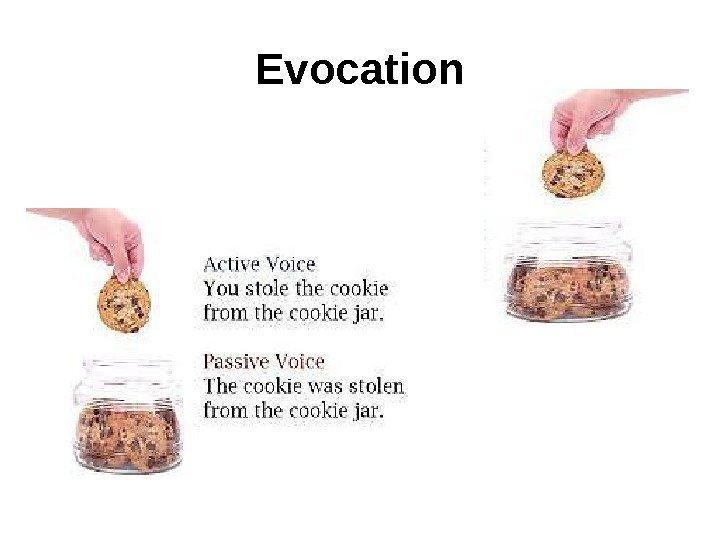
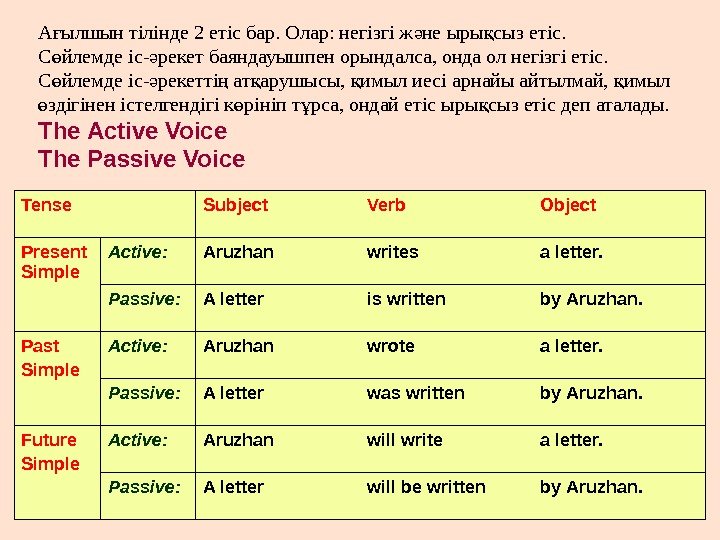
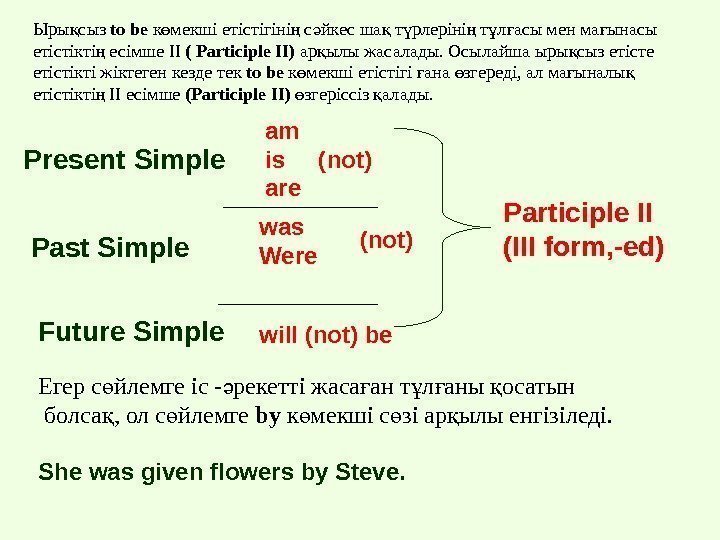
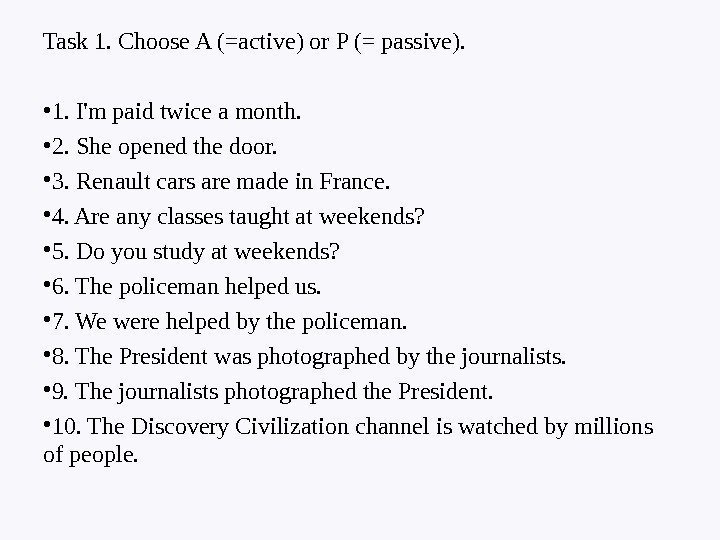
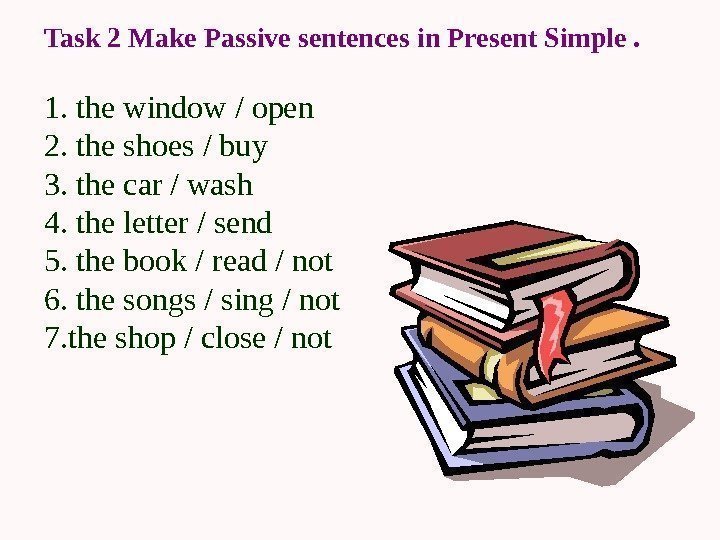
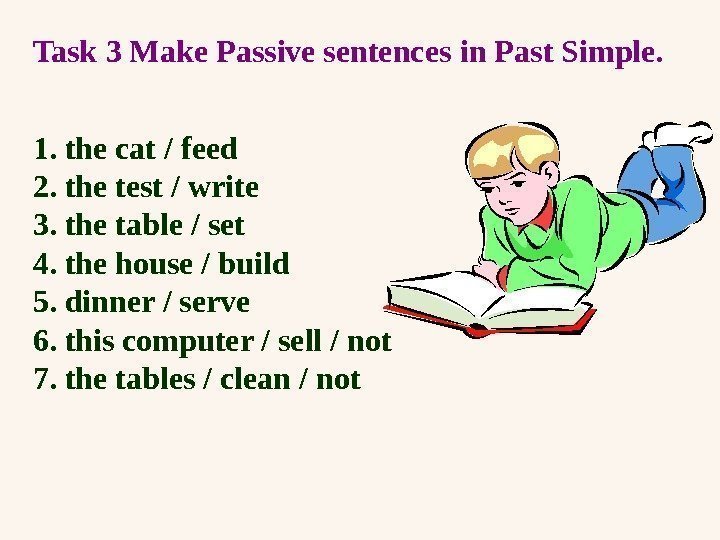
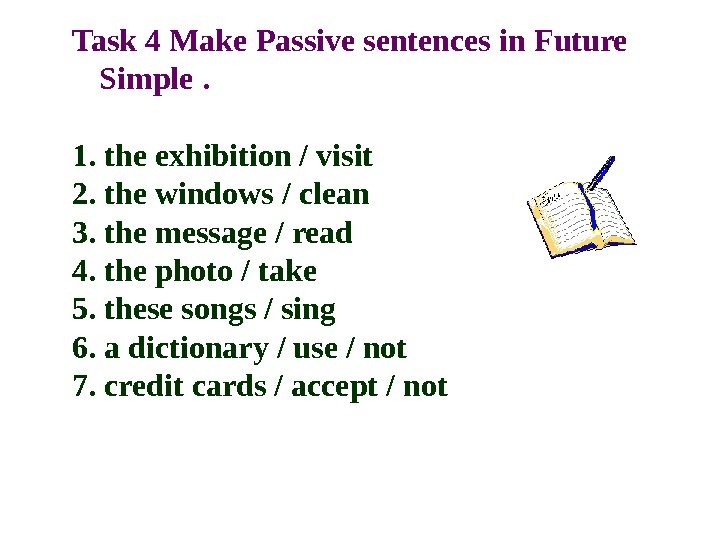
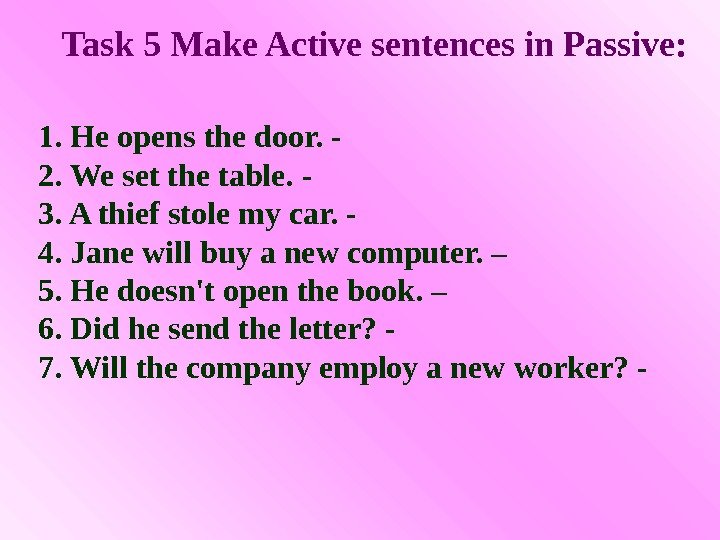
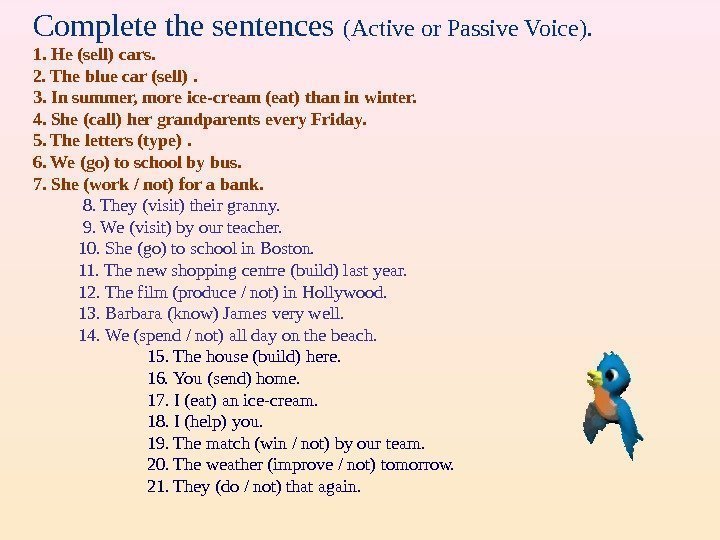
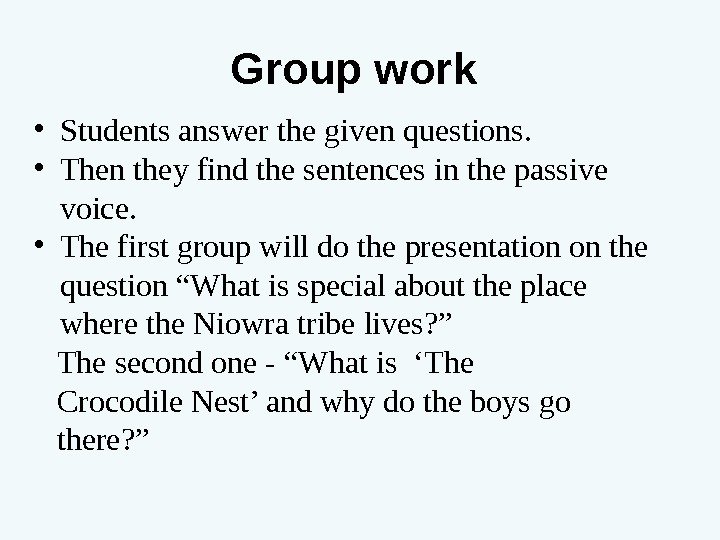

passive_voice.ppt
- Размер: 263.5 Кб
- Автор:
- Количество слайдов: 12
Описание презентации Active voice and Passive voice Shalova Aigul, the по слайдам
 Active voice and Passive voice Shalova Aigul, the teacher of English Astana city, school-lyceum #
Active voice and Passive voice Shalova Aigul, the teacher of English Astana city, school-lyceum #
 Evocation
Evocation
 А ылшын тілінде 2 етіс бар. Олар: негізгі ж не ыры сыз етіс. ғ ә қ С йлемде іс- рекет баяндауышпен орындалса, онда ол негізгі етіс. ө ә С йлемде іс- рекетті ат арушысы, имыл иесі арнайы айтылмай, имыл ө ә ң қ қ қ здігінен істелгендігі к рініп т рса, ондай етіс ыры сыз етіс деп аталады. ө ө ұ қ The Active Voice The Passive Voice Tense Subject Verb Object Present Simple Active: Aruzhan writes a letter. Passive: A letter is written b y Aruzhan. Past Simple Active: Aruzhan wrote a letter. Passive: A letter was written by Aruzhan. Future Simple Active: Aruzhan will write a letter. Passive: A letter w ill be written by Aruzhan.
А ылшын тілінде 2 етіс бар. Олар: негізгі ж не ыры сыз етіс. ғ ә қ С йлемде іс- рекет баяндауышпен орындалса, онда ол негізгі етіс. ө ә С йлемде іс- рекетті ат арушысы, имыл иесі арнайы айтылмай, имыл ө ә ң қ қ қ здігінен істелгендігі к рініп т рса, ондай етіс ыры сыз етіс деп аталады. ө ө ұ қ The Active Voice The Passive Voice Tense Subject Verb Object Present Simple Active: Aruzhan writes a letter. Passive: A letter is written b y Aruzhan. Past Simple Active: Aruzhan wrote a letter. Passive: A letter was written by Aruzhan. Future Simple Active: Aruzhan will write a letter. Passive: A letter w ill be written by Aruzhan.
 Ыры сыз қ to be к мекші етістігіні с йкес ша т рлеріні т л асы мен ма ынасы ө ң ә қ ү ң ұ ғ ғ етістікті есімше II ң ( Participle II) ар ылы жасалады. Осылайша ыры сыз етісте қ қ етістікті жіктеген кезде тек to be к мекші етістігі ана згереді, ал ма ыналы ө ғ қ етістікті II есімше ң (Participle II) згеріссіз алады. ө қ Present Simple Past Simple Future Simple am is (not) are was Were will (not) be Participle II (III form, -ed) Егер с йлемге іс — рекетті жаса ан т л аны осатын ө ә ғ ұ ғ қ болса , ол с йлемге қ ө by к мекші с зі ар ылы енгізіледі. ө ө қ She was given flowers by Steve. (not)
Ыры сыз қ to be к мекші етістігіні с йкес ша т рлеріні т л асы мен ма ынасы ө ң ә қ ү ң ұ ғ ғ етістікті есімше II ң ( Participle II) ар ылы жасалады. Осылайша ыры сыз етісте қ қ етістікті жіктеген кезде тек to be к мекші етістігі ана згереді, ал ма ыналы ө ғ қ етістікті II есімше ң (Participle II) згеріссіз алады. ө қ Present Simple Past Simple Future Simple am is (not) are was Were will (not) be Participle II (III form, -ed) Егер с йлемге іс — рекетті жаса ан т л аны осатын ө ә ғ ұ ғ қ болса , ол с йлемге қ ө by к мекші с зі ар ылы енгізіледі. ө ө қ She was given flowers by Steve. (not)
 Task 1. Choose A (=active) or P (= passive). • 1. I’m paid twice a month. • 2. She opened the door. • 3. Renault cars are made in France. • 4. Are any classes taught at weekends? • 5. Do you study at weekends? • 6. The policeman helped us. • 7. We were helped by the policeman. • 8. The President was photographed by the journalists. • 9. The journalists photographed the President. • 10. The Discovery Civilization channel is watched by millions of people.
Task 1. Choose A (=active) or P (= passive). • 1. I’m paid twice a month. • 2. She opened the door. • 3. Renault cars are made in France. • 4. Are any classes taught at weekends? • 5. Do you study at weekends? • 6. The policeman helped us. • 7. We were helped by the policeman. • 8. The President was photographed by the journalists. • 9. The journalists photographed the President. • 10. The Discovery Civilization channel is watched by millions of people.
 Task 2 Make Passive sentences in Present Simple. 1. the window / open 2. the shoes / buy 3. the car / wash 4. the letter / send 5. the book / read / not 6. the songs / sing / not 7. the shop / close / not
Task 2 Make Passive sentences in Present Simple. 1. the window / open 2. the shoes / buy 3. the car / wash 4. the letter / send 5. the book / read / not 6. the songs / sing / not 7. the shop / close / not
 Task 3 Make Passive sentences in P as t Simple. 1. the cat / feed 2. the test / write 3. the table / set 4. the house / build 5. dinner / serve 6. this computer / sell / not 7. the tables / clean / not
Task 3 Make Passive sentences in P as t Simple. 1. the cat / feed 2. the test / write 3. the table / set 4. the house / build 5. dinner / serve 6. this computer / sell / not 7. the tables / clean / not
 Task 4 Make Passive sentences in Future Simple . 1. the exhibition / visit 2. the windows / clean 3. the message / read 4. the photo / take 5. these songs / sing 6. a dictionary / use / not 7. credit cards / accept / not
Task 4 Make Passive sentences in Future Simple . 1. the exhibition / visit 2. the windows / clean 3. the message / read 4. the photo / take 5. these songs / sing 6. a dictionary / use / not 7. credit cards / accept / not
 Task 5 Make Active sentences in Passive: 1. He opens the door. — 2. We set the table. — 3. A thief stole my car. — 4. Jane will buy a new computer. – 5. He doesn’t open the book. – 6. Did he send the letter? — 7. Will the company employ a new worker? —
Task 5 Make Active sentences in Passive: 1. He opens the door. — 2. We set the table. — 3. A thief stole my car. — 4. Jane will buy a new computer. – 5. He doesn’t open the book. – 6. Did he send the letter? — 7. Will the company employ a new worker? —
 Complete the sentences (Active or Passive Voice). 1. He (sell) cars. 2. The blue car (sell). 3. In summer, more ice-cream (eat) than in winter. 4. She (call) her grandparents every Friday. 5. The letters (type). 6. We (go) to school by bus. 7. She (work / not) for a bank. 8. They (visit) their granny. 9. We (visit) by our teacher. 10. She (go) to school in Boston. 11. The new shopping centre (build) last year. 12. The film (produce / not) in Hollywood. 13. Barbara (know) James very well. 14. We (spend / not) all day on the beach. 15. The house (build) here. 16. You (send) home. 17. I (eat) an ice-cream. 18. I (help) you. 19. The match (win / not) by our team. 20. The weather (improve / not) tomorrow. 21. They (do / not) that again.
Complete the sentences (Active or Passive Voice). 1. He (sell) cars. 2. The blue car (sell). 3. In summer, more ice-cream (eat) than in winter. 4. She (call) her grandparents every Friday. 5. The letters (type). 6. We (go) to school by bus. 7. She (work / not) for a bank. 8. They (visit) their granny. 9. We (visit) by our teacher. 10. She (go) to school in Boston. 11. The new shopping centre (build) last year. 12. The film (produce / not) in Hollywood. 13. Barbara (know) James very well. 14. We (spend / not) all day on the beach. 15. The house (build) here. 16. You (send) home. 17. I (eat) an ice-cream. 18. I (help) you. 19. The match (win / not) by our team. 20. The weather (improve / not) tomorrow. 21. They (do / not) that again.
 Group work • Students answer the given questions. • Then they find the sentences in the passive voice. • The first group will do the presentation on the question “What is special about the place where the Niowra tribe lives? ” The second one — “What is ‘The Crocodile Nest’ and why do the boys go there? ”
Group work • Students answer the given questions. • Then they find the sentences in the passive voice. • The first group will do the presentation on the question “What is special about the place where the Niowra tribe lives? ” The second one — “What is ‘The Crocodile Nest’ and why do the boys go there? ”


